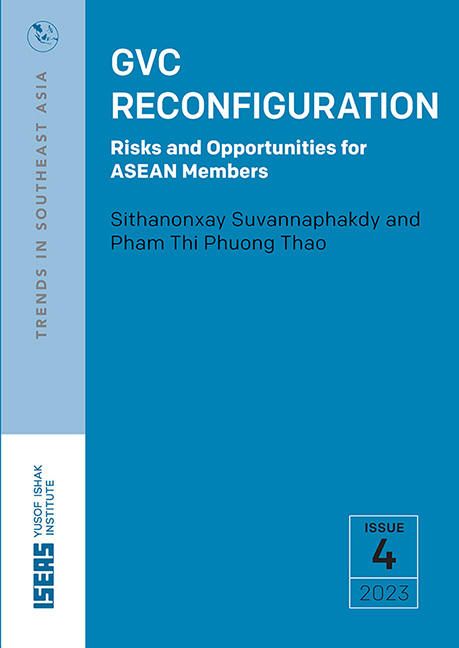GVC Reconfiguration: Risks and Opportunities for ASEAN Members
Published online by Cambridge University Press: 09 January 2024
Summary
INTRODUCTION
The COVID-19 pandemic, growing geopolitical tensions and trade disputes between the US and China, and the Russia-Ukraine war have further increased the risk of global value chain (GVC) disruptions and forced firms to strengthen resilience in their supply chains and operations. The GVC is the sequence of all functional activities required in the process of value creation involving more than one country (UNCTAD 2013). These activities range from preproduction (e.g., research and development, product design, and branding) to production and postproduction (e.g., marketing, distribution, and retailing). According to the World Bank (2020), about half of global trade involves GVCs, with services, raw materials, parts, and components crossing borders multiple times.
However, GVCs are facing risks. Firstly, the pandemic has brought disruptions on both the supply and demand sides. On the supply side, infections reduce labour supply and productivity in export-oriented sectors, while lockdowns, business closures and social distancing cause supply disruptions. On the demand side, layoffs, loss of income and worsened economic prospects reduce household consumption and corporate investment. The extreme uncertainty about the path, duration and impact of the pandemic could lead to reductions in business and consumer confidence which in turn could increase job losses and investment. Secondly, US-China trade tensions have added 20 per cent to global uncertainty since 2016, peaking during the first quarter of 2020 and declining under the Biden administration (Solingen, Meng, and Xu 2021).
The McKinsey Global Institute estimates the negative economic impact of the pandemic to be at US$30,000 billion or 35.2 per cent of global gross domestic product (GDP) in 2020, and that of the US-China trade dispute at US$200 billion or 0.2 per cent of global GDP. Balancing the economic efficiency gains from the GVCs and the economic costs of the pandemic and geopolitical shocks entails a search for an ideal GVC that can resist, mitigate and adapt to disruptions in supply and production chains.
This study assesses risks to GVCs in thirty-five sectors in nine ASEAN countries using value-added trade data from the Asian Development Bank’s (ADB) multi-region input-output tables (MRIO).
- Type
- Chapter
- Information
- GVC ReconfigurationRisks and Opportunities for ASEAN Members, pp. 1 - 76Publisher: ISEAS–Yusof Ishak InstitutePrint publication year: 2023



